How Trent Dalton confronted the truth about his own love story
‘Good father, OK husband, shithouse lover’. In adapting his book Love Stories with his wife for a new play, Trent Dalton decides to remove his rose-coloured glasses and face up to his flaws.
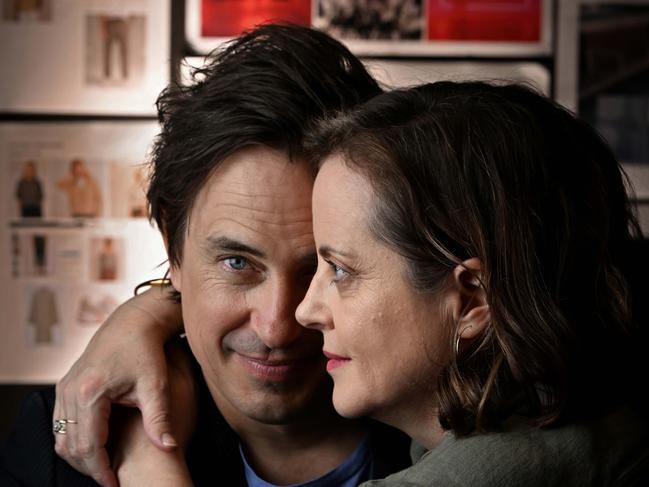
WIFE: What are you actually hoping to find on that corner?
HUSBAND: I don’t know. I thought I might find those answers you were talking about. I thought I might find love.
WIFE: Really? I was under the impression you’d already found it.
On December 10, 2021, at precisely 12.43pm, I received a text message from my dear friend Tim McGarry, the gifted Australian playwright who had just adapted my book, Boy Swallows Universe, into a record-breaking Queensland Theatre play.
“Trent, I’m 66 pages into Love Stories,” he wrote. “Like, f..king wow. Would make a great play!”
Love Stories is a book I wrote after sitting for two months on the corner of Adelaide and Albert streets, Brisbane, with a sky-blue Olivetti typewriter – bequeathed to me by an earthbound suburban angel who died on Christmas Day 2020 – asking 150 strangers to tell me their deepest and most cherished love stories.
I had two small chairs, a small writing desk and a big sign: “Sentimental writer collecting love stories. Do you have one to share?” Quite possibly the most fulfilling and inspiring journalistic endeavour of my life.
I never could have anticipated the number of beautiful and tragic love stories swirling around that corner on the edge of King George Square, beneath the shadow of our beloved Brisbane City Hall clock tower.
A blind man yearns to see the face of his wife of 30 years. A divorced mother has a secret love affair with a priest. A geologist discovers a three-minute video recorded by his wife before she died. A tree lopper’s heart falls in a forest. A working mum contemplates taking down photographs of her late husband from her fridge. A girl writes one last letter to the man she loves most, then sets it on fire. A palliative care nurse helps a dying woman converse with the angel at the end of her bed. A renowned 100-year-old scientist ponders the one great earthly puzzle he was never able to solve: “What is love?” Endless stories from the beautiful strangers of my city. Human stories. Love stories.
Tim wasn’t the only one thinking about a life on stage for all these wondrous real-life tales. About a week before his text, my wife, Fiona Franzmann, looking for a creative endeavour of her own, had turned to me with a simple notion: “You know, we could turn Love Stories into a play.” But how could we possibly pull all these stories together to form a seamless narrative strong enough to carry an audience through roughly 90 minutes of Australian theatre? I had some thoughts on that.
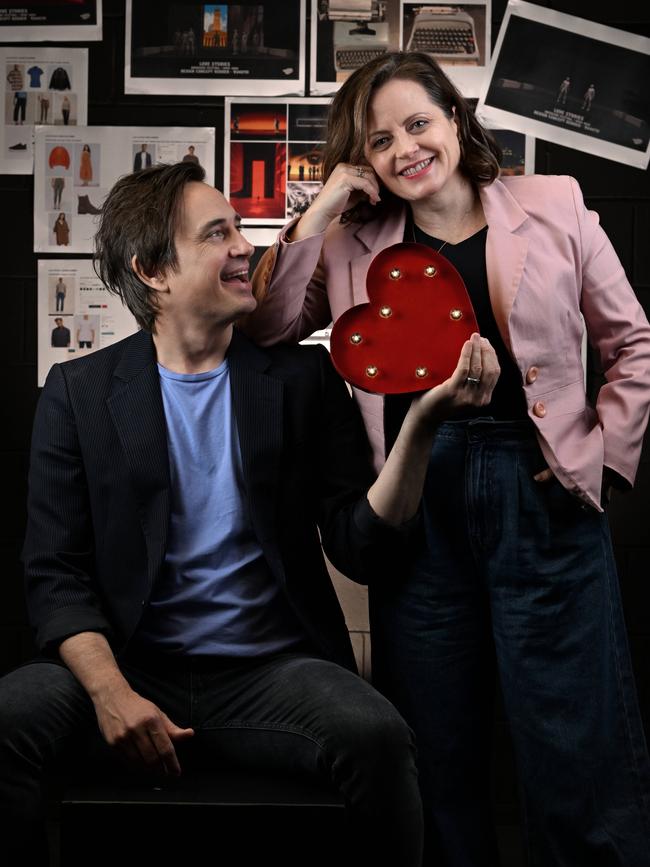
What if we drew on all that gritty and soul-deep relationship stuff that occurred daily in our own home and, doubtless, the homes of countless Australian couples? What if I were brave enough to remove the rose-coloured glasses that so often I was prone to wearing and we took an unvarnished look at our own marriage; let some of the universal wonders and pains and misunderstandings and miscommunications that Fiona and I had encountered over 24 years inform a central trunk love story that bent and nearly broke and maybe even grew stronger in accordance to every story our writer character was documenting on that corner? What if we honestly explored the inner workings of that writer sitting on his beloved corner and asked why on earth it was that this monumental ignoramus took the time to hear the love stories of 150 strangers and neglected to invite the love of his life to tell him what love is?
What if I came clean? What if I decided to tell the world my own truth about that book I wrote called Love Stories: that all those wondrous Brisbane strangers on that corner might have actually saved my marriage?
WIFE: We’re nowhere near as intimate as we used to be.
HUSBAND: Nobody, in the history of marriage, has been “intimate like they used to be” in a three-bedroom house with two kids.
WIFE: I’m tired … tired of the same arguments … about whose career takes precedence, who stays home when the kids are sick … who gets to chase their dreams and who gets to check the kids for head lice.
Gifted Australian theatre director Sam Strong (Storm Boy, Jasper Jones) loved the thought of what we came to call “the marriage arc”. Sam’s boundless vision and bone-deep sense for stagecraft saw the 2021 Boy Swallows Universe theatre adaptation become QPAC’s highest selling drama. It was, we sensed, time to get the band back together.
Fiona, who is forever trying to maintain a semblance of privacy for our family in the face of a partner prone to mining some of the most personal aspects of our lives for public consumption, took some convincing that a loose avatar of her should form a key character in the play. She agreed only if the characters weren’t called Fiona and Trent. We started calling them Husband and Wife, for want of better descriptors.
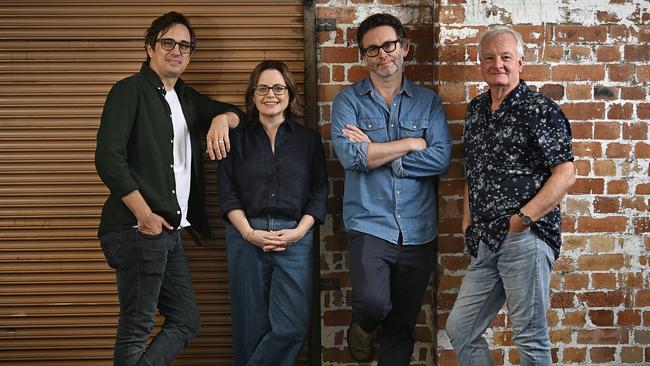
To be clear, this marriage I speak of was by no means broken and scattered on the rocks. But it’s fair to say there were some holes in the hull of it that needed fixing. Step one, remove one’s head from one’s own backside. Face up to my flaws. Same ol’ knuckleheaded husband stuff: too much time spent alone in your head, not enough time spent with your wife in bed. Too wrapped up in work. Too ambitious. Too selfish. Too self-absorbed. Not attuned to the invisible frequencies of true love, too tuned in to ABC Grandstand. Too confident. Too naive. Too proud. Not present enough at home, even when I’m at home. Good father, OK husband, shithouse lover. Sometimes I’m as warm and intimate as a rusting Kelvinator. Too blind to the needs and wants of a good woman whom I’d die for; too careless with this rare and lucky love that keeps me alive. Too forehead-smacking-stupid to realise something as precious as a 24-year-old love story must never be taken for granted if it’s ever going to make it to 50 and 60 and maybe even 70 years, like some of those epic and miraculous love stories I heard on that corner of Adelaide and Albert.
Tim set about threading the real-life love stories that I gathered on that corner – maintaining the very much real-life dialogue of 50-plus real-life Brisbane storytellers – around a central love story that he so generously encouraged Fiona and me to script dialogue for. Tim and Sam encouraged us to mine the most heated disagreements, the most complicated sore points that a long-term couple might wrestle with, promising to treat such material with respect and understanding, a promise they have stayed true to, and then some. They wanted the good stuff, too. The beautiful stuff where it all makes sense and it all fits like clockwork and the sky shimmers with the giddy promise of it all. Because real love is up and down and push and pull and past and present and under and over and you and me and me and you and us and them and everything, everywhere, all at once.
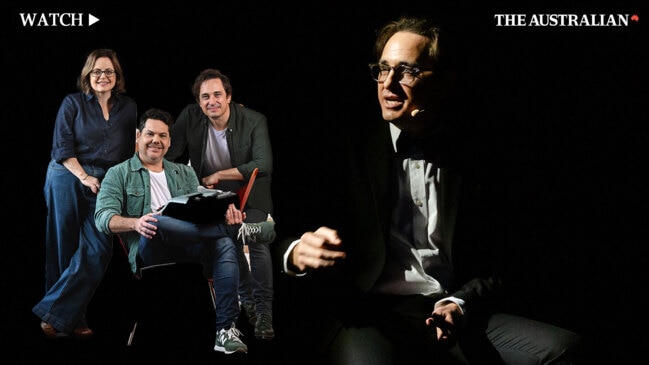
For weeks and months, in the sacred creative window between school drop-off and pick-up, Fiona and I sat with our laptops at our kitchen table at home and in bars and cafes across Brisbane, exploring the bright-shining successes and glorious failings of our and many others’ love stories. These honest real-world conflicts and confusions could then be amplified and interrogated openly through the Husband and Wife characters, fictionalised and bastardised extensions of our true selves, to reflect some hard and wondrous universal truths about love that any person in the audience of any background, sexual orientation, age or relationship status potentially could connect to.
We trawled through real-life letters and emails and text exchanges in search of dialogic nuggets that might serve the complex story we were trying to tell on stage. We sent Sam and Tim endless pages of the most breathtakingly personal insights into a marriage, letting rip with the freedom of knowing these characters weren’t wholly us but a more honest, more troubled, more interesting version of us. We were a couple possessed.
These writing sessions between my wife and me were exposing, confronting, hilarious, painful, rewarding and, most unexpectedly, deeply romantic. While great chunks of our musings never made it to the final script, the process of creating them was entirely electrifying. When the central trunk love story was strong enough to stand, we added some new branches to the tree.
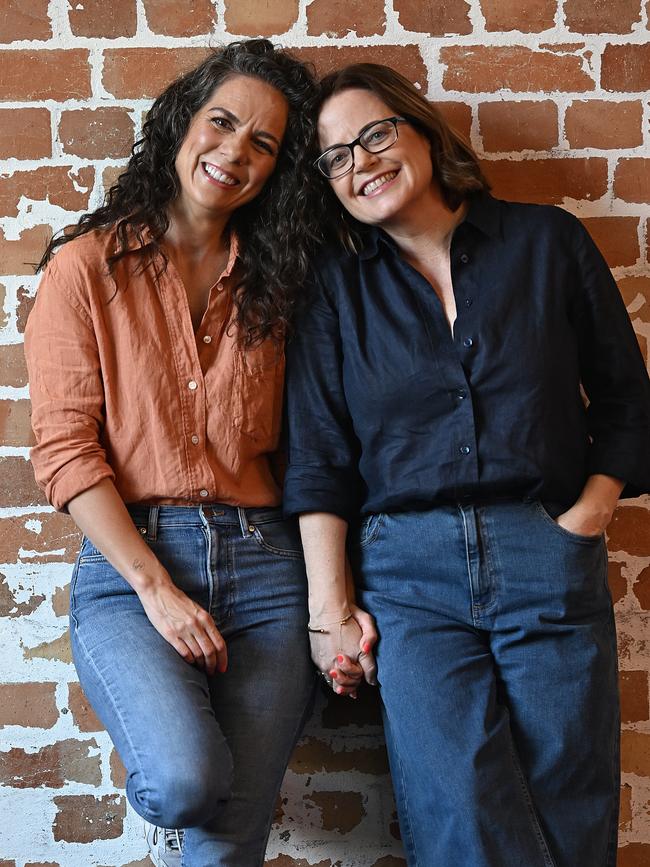
I opened up a Gmail account I had created three years ago, lovestoriesbox@gmail.com, for the dozens of people I encountered at book events and in the street and online who would tell me how much they would like to send me a love story. This inbox is now filled with hundreds of random love stories from storytellers across Australia and the world (and I humbly invite anyone reading this to add to it should they feel inclined). The most heartfelt, love-filled stories about the loss and longing of love; about the newness of it and the reach of it, how it crosses time and oceans; how it even traverses the most treacherous gulfs, the ones we sometimes dig ourselves out of hate and anger and despair.
I sent Tim and Sam a 110-page document filled with additional love stories to complement the existing stories from the book.
Random epic World War II love stories told to me in the space of two paragraphs. Anita Smith, Manly West, Queensland:
My father, Antoni Ejsak, was born in 1913 in Poland. He was captured in the battle of Lviv where 90 per cent of soldiers died. He was sent to a prison farm in Germany as a worker. My mother, Lina Fladung, was born in 1923 in Germany. She lived on the family farm where Anton was sent to. They fell in love, she helped him escape. He was caught again and sent back to the same farm. Records show that he was sent to multiple sites, including in Denmark, but he always made his way back to her. Once the war was over they married in June 1945. They couldn’t go back to Poland as she was German, they couldn’t stay in Germany as he was Polish, and two of her siblings disowned Lina as a consequence. They moved around displaced persons camps and eventually made their way to Australia. Short version!
Random tales of dog love among the chaos of human existence. Janine English, Horsham, Victoria:
I was parked down by the river with my two German short-haired pointers, heads hanging out the back window, when an old couple came walking up to say what beautiful dogs they were. The wife told me that they’d had a little jack russell dog that had recently passed away. I went on to say that my two boys had lost their sister, who was also a jack russell, four weeks ago to cancer. She asked how old our jack russell was when she passed and then told me that their dog was 17 years old and that they walked her every day. Then the husband says, “And I actually still do.” He then proceeds to pull the dog’s collar out of his pocket.
The most gut-wrenching, soul-restoring love stories with perfect endings such as this one from Larissa in Brisbane, speaking about the love she has for her son, Cooper:
Autism is hard for mums, though, there aren’t any kisses or squishy, long hugs. But there are many “I love yous”. Not a day has gone by without Cooper saying, “I love you, Mum.” One day, when he was about 10 years old, we were driving in the car and he asked, “Mummy, you know how I have autism, does that mean God thinks I’m one of his really special ones? Am I on his special list?” Yes, my love, you are one of the really special ones.
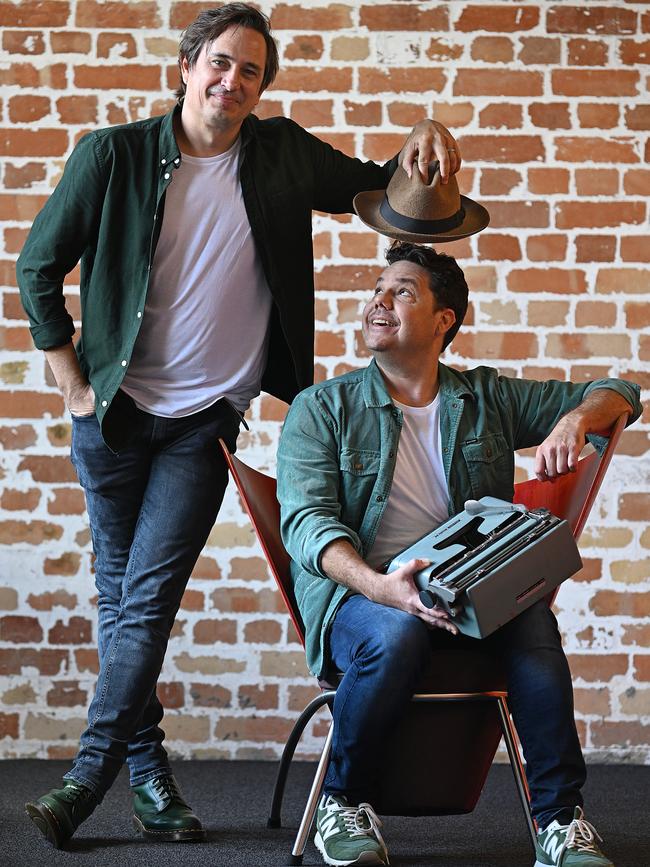
I know what love is. Love is hard. Love is the easiest thing in the world and the toughest challenge we’ll ever face. Love is more mysterious than dark matter but just as pervasive. Love is not dead. It’s alive. It breathes. It breeds. It multiplies. Love is infectious. Love is work. Love is leisure. Love can’t be bought and love can’t be owned but it can be kept and cherished and treasured and locked forever inside a human heart. Love is given and love is received and the receiver must remember to work hard to hold on to that precious gift because the giver is always allowed to take that gift back. Love is an equal opportunity phenomenon. The school lollipop lady has as much access to it as the millionaire defence lawyer, and that’s so often why the lollipop lady is the happier of the two. Love is a thousand things at once and only ever this one impossible thing: everything.
I knew all this before I went to that corner. Those beautiful Brisbane strangers simply reminded me of everything I already knew about love. And that’s what I hope the audience gets out of our Love Stories play. Through honest dialogue and dance and movement and groundbreaking stage technology, Sam and Tim and their glorious team of actors and theatre-makers are going to place our audience smack-bang on that corner of Adelaide and Albert Street, Brisbane. I hope they will laugh as much as I did. I know for certain they will cry.
And maybe, if they’re one of the lucky ones who have felt it before, they’ll be reminded of everything they already know about love.
Love Stories will be at the Playhouse, QPAC, September 10-29, as part of Brisbane Festival. Bookings: brisbanefestival.com.au.



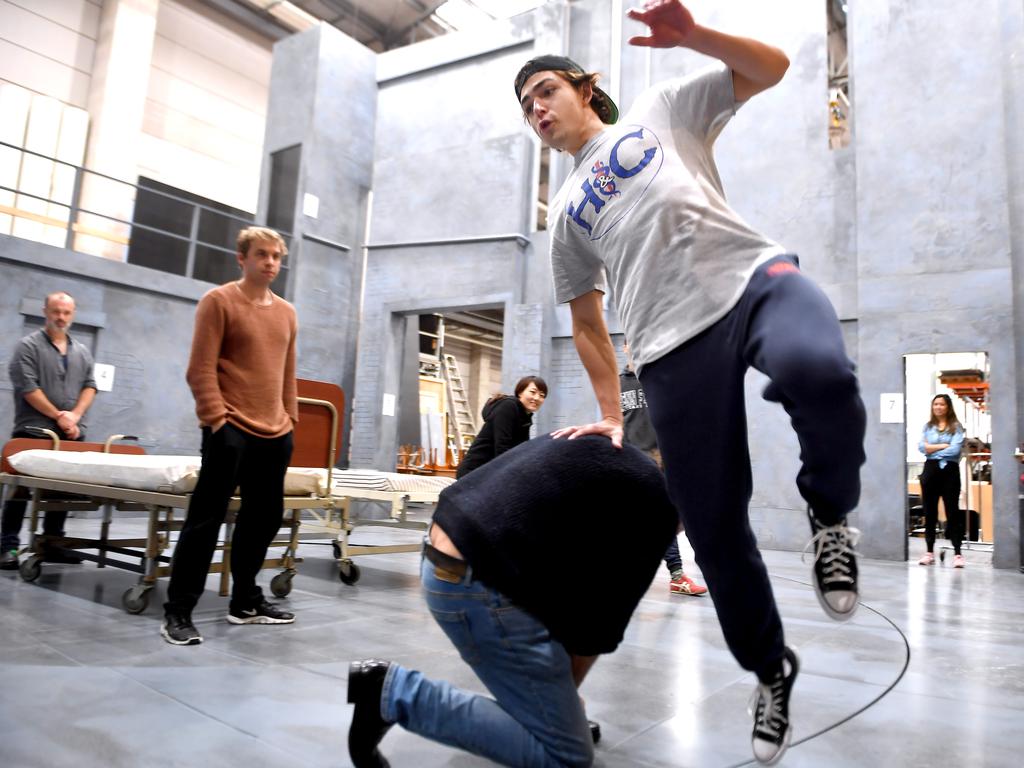

To join the conversation, please log in. Don't have an account? Register
Join the conversation, you are commenting as Logout